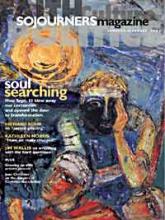The term reconciliation carries such a chord of optimism; it conjures images of issues resolved and friendships re-established. But it’s usually wrenching work.
It can also be painful, yet cathartic, to watch. A Washington, D.C.-based organization called Search for Common Ground wanted to demonstrate creative ways of resolving conflict, and they did so through a creative medium: film. The organization held its first film festival in October with eight powerful documentaries that address themes of conflict resolution and reconciliation.
The films range in style, length, and structure, but their cumulative effect forces us to see all the angles of conflict. Not only do we watch others navigate the hard path of forgiveness, history, and truth, we have to wonder ourselves about the nature of reconciliation: What is it really? Where does it take place? The films move viewers beyond viewing to dialogue, one of the festival’s goals.
The films will travel for one year to universities and colleges throughout the country as part of Search for Common Ground’s mission to promote peaceful, cooperative approaches to conflict resolution. In May, the European Centre for Common Ground in Brussels will host the film festival, after which the films will travel to European universities and international organizations. For more information and a listing of colleges that will host the film series, see www. sfcg.org.
Long Night’s Journey into Day: South Africa’s Search for Truth and Reconciliation, directed by Frances Reid and Deborah Hoffman. The 94-minute documentary looks at four groups of people making their way through the truth and reconciliation process, including the family of Amy Biehl. The film won best documentary at the 2000 Sundance Festival. (Iris Film/Cinemax Reel Life, 2000)
Read the Full Article
